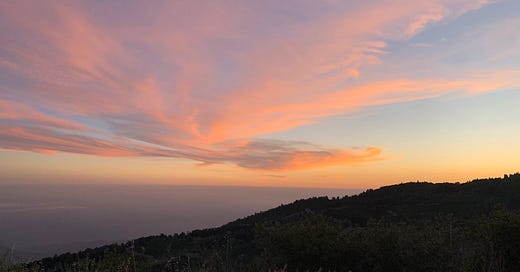The human being is so difficult to satisfy.
My baby woke me up and I wanted to sleep longer.
I made wudu and I wanted the water to be warmer.
My kids had breakfast and wanted eggs, not oatmeal.
I got in a tiff with my spouse and I wanted them to be sweeter.
I drove to work and I wanted my car to be nicer.
I hit traffic and I wanted my commute to be shorter.
I got my bonus and I wanted to earn more money.
I came home and I wanted my house to be bigger.
We are a maximizing culture: read the reviews for the best restaurant, throw the party with the greatest attention to detail, dress according to the newest trends, upgrade the phone/car/TV to the latest model, get the biggest mortgage the bank will give you.
Our society necessitates this: late-stage capitalism requires utmost maximizing. Capitalism only works by maximizing profit and productivity–demanding that you spend your money and you spend your time in its service.
And it’s also human nature.
The Prophet (ﷺ) said, "If the son of Adam (the human being) had two valleys of money, he would wish for a third, for nothing can fill [his] belly except dust…" (Sahih Bukhari)
We want more. We want to be more. Have more. Be liked more. It soothes our internal state of never-enough-ness.
But in contentment, there is freedom. Contentment is a state of satisfaction with what is, by not just accepting what is, but being pleased with what is. It is freedom from wanting things to be anything other than what they are, freedom from the exhaustion of always chasing more.
When evaluating how people make decisions, behavioral economists categorize two groups: “maximizers” and “satisficers”. Maximizers are more pain-staking in their decision-making; deliberative in reviewing all the data for the hopes of selecting the “best” option. Satisficers take a “good enough” approach: they make decisions faster, without considering all options. Objectively, they may not achieve the same results as seen on the outside, but they are more satisfied on the inside: maximizers, despite having the “optimal” outcome, tend to be more depressed and experience more regret.
What would a more satisfied, a more contented life look like? The cornerstone of it is gratitude.
Gratitude, at it’s essence, requires noticing. You can’t be grateful for the things you have if you don’t notice you have them–and our brain’s natural tendency is to desensitize itself to what already exists.
It’s why you don’t feel the socks on your feet. It’s why the couch you got that you first thought was too big seems to look fine now, or why that pile of boxes has been sitting there for a week and a half and you’ve kind of lost sight of them–your brain just stops noticing.
Gratitude requires re-sensitizing to what’s around you. And it doesn’t have to be relative to anyone else: somebody doesn’t need to have less for you to feel like you have enough. You only have to notice—simply—what is. That’s where gratitude starts.
Noticing my son’s chunky rolls. Alhamdulillah for my baby.
Noticing the clean water from my faucet. Alhamdulillah for my running water.
Noticing how tall my daughter has gotten. Alhamdulillah for her good health and growth.
Noticing what I’m putting in my mouth, rather than scarfing it down while scrolling. Alhamdulillah for fresh food.
Noticing my reliable transportation. Noticing my warm house. Noticing my ability to buy food for my family. Noticing my companion, noticing their support of me. Alhamdulillah for it all.
Chasing more is an act of not-noticing, of being distracted by the idea of having more, by craving the dopamine hit of obtaining more.
How would it feel to stop running for a minute? Pause, catch a breath. Take a look around. Notice. Alhamdulillah.
***




Beautiful piece!
Simple yet so thought provoking……
I love this so much. Thank you!